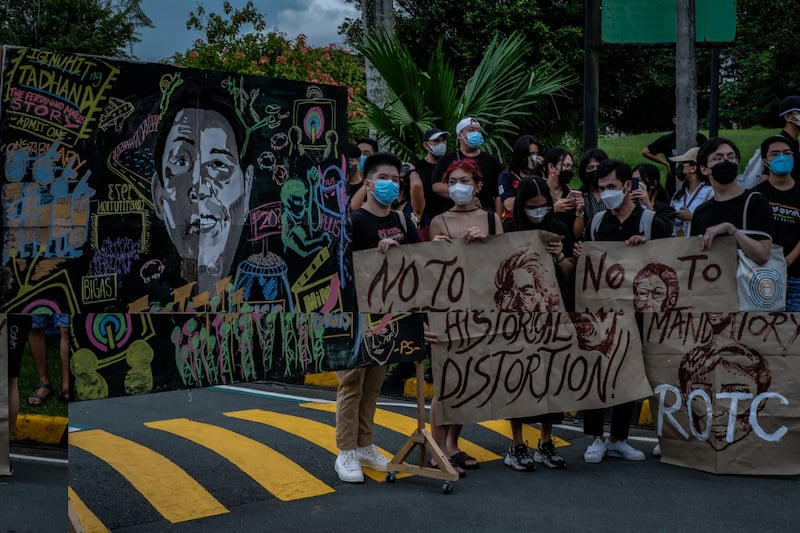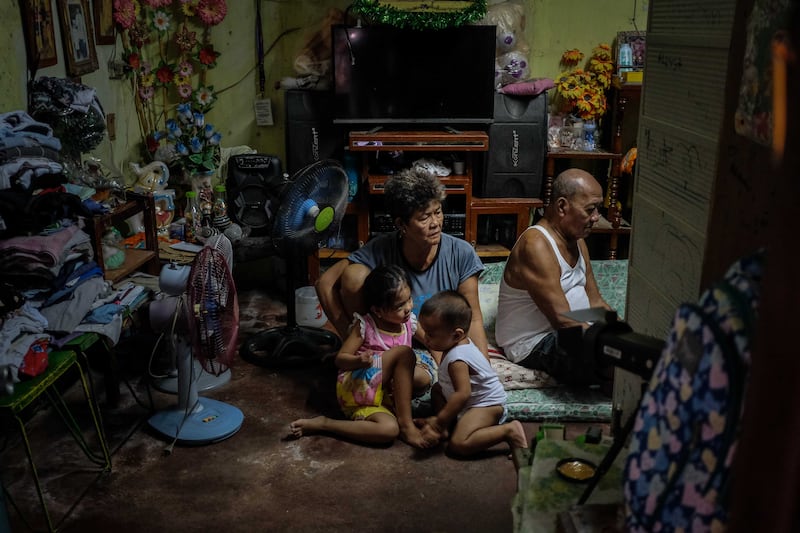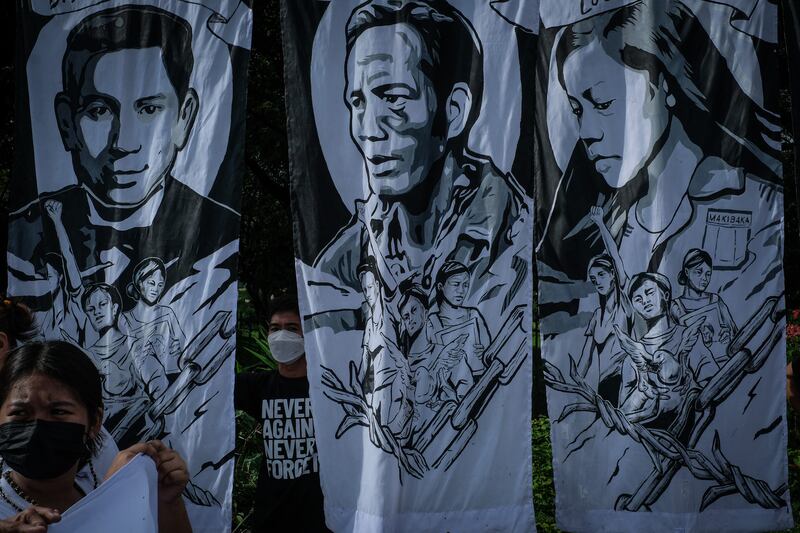Filipinos on Wednesday marked the 50th anniversary of Ferdinand E. Marcos’ martial law declaration, as victims recalled the horrors they endured under his regime and young people urged peers not to forget that dark episode in Philippine history.
Some 8,000 people gathered in and around the University of the Philippines’ main campus to pay homage to the thousands of Filipinos who, human rights groups allege, were killed, abducted, tortured or imprisoned during the martial law era (1972-1986).
The milestone commemoration was particularly bitter and painful for some because the late dictator’s namesake son was elected president in a landslide in May, a turn of events that has baffled critics of the dynastic Marcos family.
Many of the protesters wore black shirts and chanted “Never forget. Never again.”
They were protesting against the return to power of the Marcoses and what they see as historical revisionism and attempts to whitewash atrocities committed under the patriarch’s rule.
“I wish my friends who do not believe in martial law were here to know what really happened then. It’s time for the young generation, us, to continue the fight and not let their (victims’) stories die,” said Joy Renato, a university student who is not old enough yet to vote.

Jared Manaloto, who also took part in the commemorative activities, echoed that sentiment.
“It is good that people are here to commemorate it but, unfortunately, many more Filipinos are blinded. It’s sad that they have become victims of fake news. I was one of them until I found out I was believing in lies,” said Manalato, a recent graduate and call center agent who voted for Leni Robredo, a rival contender to Ferdinand Marcos Jr. in the presidential polls.
On Sept. 21, 1972, then-President Marcos signed a proclamation placing the entire country under martial law. Two days later, he went on national television to announce that decision.
He died in a Hawaiian exile in 1989, three years after a people-power revolt, aided by powerful senior government officials who had abandoned Marcos, toppled his regime.
As of late Wednesday (Manila time), the Office of the President had yet to issue a statement marking the anniversary. At the time, the new Philippine president was visiting the United States.
On Aug. 21, Marcos Jr. had also remained silent and did not issue a statement - as was customary among Philippine leaders - to mark the death anniversary of former Sen. Benigno “Ninoy” Aquino Jr., who was shot dead at Manila’s international airport in 1983 upon alleged orders of the elder Marcos. Aquino’s assassination later unleashed the movement that culminated in the peaceful revolt against Marcos in 1986.
So far, Marcos Jr. has refused to apologize for his father’s brutal rule.
In his first televised interview since his electoral victory, the younger Marcos defended the 1972 martial law proclamation, saying it was necessary then because the Philippines was facing national security threats from communist rebels as well as Muslim separatist guerrillas in the south. He also defended his family from accusations of distorting facts.
"Martial law was declared because of the wars, the two wars we were fighting on two fronts," he said in an interview that aired on the ALLTV channel Sept. 13. "Those were the dangers, the perils the country was facing."

‘They killed people like chickens’
About 70,000 people were imprisoned, 34,000 tortured, and over 3,200 were killed during the regime, according to Amnesty International.
Many of the survivors now live in poverty, such as in cramped houses located in Dagat-Dagatan, a suburb in Caloocan City north of Manila.
One of them was Pacita Armada, 62, who was just 16 years old when police raided her family’s Manila home in the late 1970s. The police were looking for her uncle, a union worker. They could not locate him, so they arrested Armada instead.
“Authorities ordered me to find my uncle’s documents. I had no idea where or what they were. They shoved my head onto the plate rack. One of them was pounding my hand. I was crying and panicking,” Armada told BenarNews in an interview this month.
Armada spent two months in prison, mostly without water and food. Her father worried about her condition but did not live to see his daughter be set free.
Cecilio Bejer, another victim of martial law, was arrested when authorities raided an office and caught him and other activists making protest posters. In prison, he said, he suffered physical and mental torture.
“We were kept in a freezing cold room, they were kicking us. In detention, I remember eating rice with weevils and a nearly rotten fish,” he recalled.
Now 71, Bejer vows to continue sharing his and other survivors’ stories to the public for as long as he can.
“In our own little way, in whatever little contribution we can make, we will keep on joining this fight until our bodies would still allow us [to],” Bejer said.

Joel Lamangan, an award-winning film director, was arrested and tortured when he was 16 years old. A former member of the militant group Kabataang Makabayan, Lamangan was detained twice: first, after graduating from high school in 1973, and in 1977.
“It was inhumane. I saw how they killed people like chickens,” Lamangan told BenarNews. “Four years of my youth were destroyed because of these injustices.”
After criticizing a newly made Marcos-backed movie, " Maid in Malacañang," which portrays the family in their last 72 hours in power in 1986, Lamangan said he received constant death threats and attacks online.
Some of his friends and family have asked him to back down – an option that never crossed his mind.
“It will take a long time for us to surrender. I will never stop. This is a continuous fight,” he said.

Meanwhile, artists and advocates including Lamangan are trying to fight efforts to disseminate disinformation online and whitewash the country’s dark chapter under the Marcoses as the Philippines’ “golden era.”
A documentary film, “11,103,” which features the stories of survivors, premiered on Wednesday at the University of the Philippines’ main campus in Quezon City, directly countering many of the false narratives peddled online.
The film will be screened in major Philippine provinces and in different parts of the United States, including New York City.
“The price of democracy is eternal vigilance,” Kara Magsanoc-Alikpala, the film’s producer, during the premiere.
“Let’s not dishonor those who suffered and fought the dictatorship and paved the way for our hard-earned freedom in 1986. We have to fight for their truths,” Magsanoc-Alikpala said.
The film’s title represents the number of human rights victims who were officially recognized by the government and received compensation from the Marcoses’ ill-gotten wealth, valued at U.S. $172 million, and which Switzerland returned to the Philippines.
Applications submitted by nearly 100,000 victims are pending verification and approval, according to the Human Rights Violations Victims’ Memorial Commission, a Philippine government-appointed body.
Views from the fourth estate
On Wednesday, Philippine journalist groups and free press advocates also paid tribute to the people from the industry who risked their lives in fighting for truth under martial law.
During that era, journalists were arrested and private media groups, including broadcaster ABS-CBN, were sequestered, with only crony-controlled press allowed to operate. An underground media, commonly referred to as the ‘Mosquito Press,’ persisted against the dictatorship and reported on the realities of Marcos’ rule.
The National Union of Journalists in the Philippines (NUJP) and the Foreign Correspondents Association of the Philippines (FOCAP) likened the current climate for press freedom to the martial law years, when critical reporting was easily equated to government opposition.
“On the 50th year since the declaration of Martial Law, Filipino journalists remember those who remained loyal to the truth and who did so despite a lack of resources and at considerable risk to themselves,” NUJP said in a statement. “It is in this spirit that we stand today with them [the Mosquito Press] and with each other to join the country in saying Never Again.”
